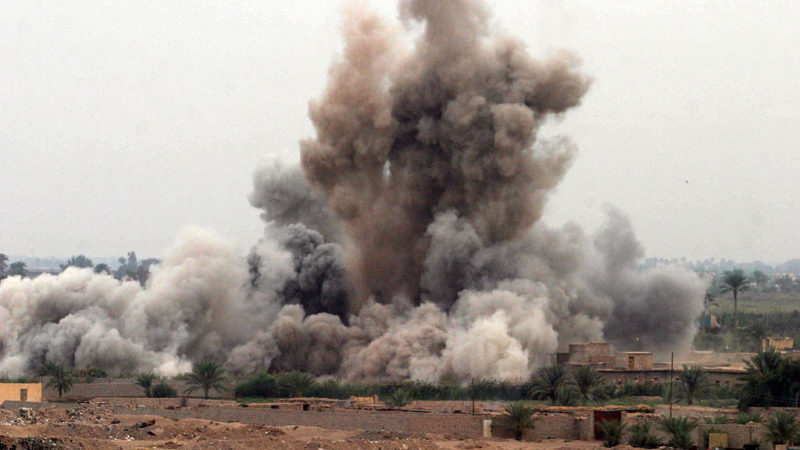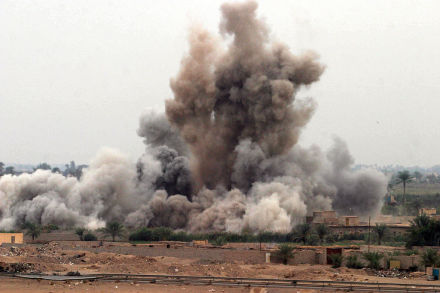
Over eleven years ago, MPs filed into the House of Commons to determine whether the UK should invade Iraq. There’s no need to rehash what happened, we all remember the outcome. Today, another crucial vote on Iraq will take place. MPs will decide if the UK should join the US and France in carrying out air strikes in Iraq, to counter the rise of the Islamic State (IS). Although it’s yet to take place, the result is a foregone conclusion. The UK will take part in bombing.
This a fundamental mistake.
The reason for intervention in 2003 and the rationale for air strikes now are, undeniably, very different – one was launched on the false premise of weapons of mass destruction, the other on the very real existence of IS (and in this case, Western forces have been invited to intervene by the Iraqi government). Yet, they are bound together.
Intervention is what got Iraqi people here in the first place.

Before western involvement in Iraq (including action that predated 2003), there was no significant fighting between Iraq’s religions, sects, ethnicities or nationalities. The state did violently repress the Kurdish minority but this was unpopular amongst most Iraqis. Though Saddam Hussein’s Ba’athist party was incredibly violent and repressive, and left many Shias (and others) feeling powerless, it did not create rifts at a community level in the way many may imagine.
There is overwhelming evidence that violent divides between Shia and Sunni Muslims in Iraq were a product of intervention. The US-led forced established a political system that ‘empowered sectarian parties’ by promoting Shias within government and actively disenfranchising Sunnis.
Former Prime Minister Nouri al-Maliki continued this trend; he refused to integrate Sunnis from the Awakening Movement into the army, neutralised the power of any political opponents and repressed Sunnis throughout Iraq.
It is in this context that we must understand the rise of IS. Alongside the instability produced by a bloody civil war in Syria, which has allowed IS to grow in numbers and strength, the political situation in Iraq has meant that some of the Sunnis subjugated by the Shia dominated government, as well as people recruited in Syria during the civil war and foreign fighters from across the region (and some from Western states), are many of those who have taken up arms.
Air strikes will further entrench divides between these groups and push more people into the arms of IS.
It is also no given that air strikes will save more lives than they end. Bombing in Iraq will add to the estimated 133,000 civilians killed in Iraq since 2003. Such deaths are tragedy in and of themselves. However, they will also add to the despair and powerlessness felt by many people within the country – particularly as they are at the hands of Western powers – and could therefore serve to bolster the appeal of IS.
So even if the Islamic State is militarily defeated – and this could mean a lengthy campaign that eventually includes deploying western troops on the ground – this will not be the end of terrorism and turmoil, but another checkpoint on a continuum of violence that divides communities in the region.
The counter to this argument is that the very immediate and very real threat of the IS requires a Western military response. It is ‘our duty’, so the story goes. However, this immediate rush to bomb enemies out of existence is short-sighted and proves that we have learnt nothing from the past.
No one is looking to defend the incredibly violent actions of IS – children, women and men have been killed across the region, including journalists Jim Foley and Steven Sotloff and aid worker David Haines, who were beheaded by IS fighters. But opposing US and UK bombing does not mean dismissing the seriousness of the situation, nor disregarding the importance of people’s lives in Iraq.
Instead, the best course of action is, as Mehdi Hasan has suggested, for Western powers to engage with regional governments – namely Shia-led Iran and Sunni-led Saudi Arabia – to put pressure on respective religious groups in Iraq to cooperate with one another both politically and militarily to defeat IS. Western powers could also channel more efforts into helping to create an inclusive Iraqi government and put more pressure Gulf States to cut down the illicit flows of money that fund IS.
Yet these suggestions and warnings will go unheeded by most MPs. Unfortunately, the outcome of today’s vote will be a predictable one. Although no one can be sure of what the future holds, history would surely indicate this a huge mistake.




More from LabourList
Economic stability for an uncertain world: Spring Statement 2026
‘Biggest investment programme in our history’: Welsh Labour commit to NHS revamp if successful in Senedd elections
James Frith and Sharon Hodgson promoted as government ministers